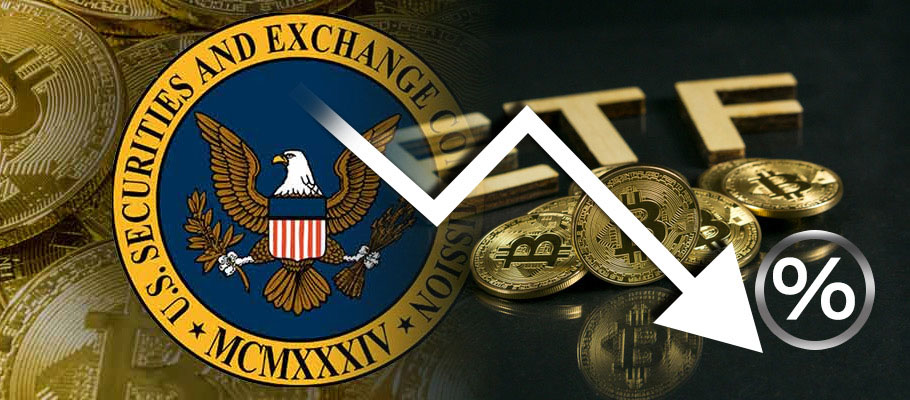
Published: August 16th, 2023
An increasingly crypto-skeptic US Securities and Exchange Commission (SEC) has decided to sit on the high-profile application for a spot Bitcoin exchange-traded fund from ARK 21Shares, delaying it indefinitely.
In a filing on Tuesday, America's top financial services regulator said it needed more time to consider the application’s merits before deciding to approve or deny it.
ARK Invest filed its application for a Bitcoin ETF, called Ark21Shares, in May of 2021. The company partnered with its Swiss sister company 21Shares AG to launch the new product. If it gets the green light, shares in the ETF would be listed on the Cboe BZX Exchange as ARKB.
ETF’s track the underlying price of a given asset. They enable investors to take a position in unpredictable assets like crypto, without owning the asset directly. Many investors see ETFs as a way to take advantage of crypto gains while shielding themselves from potential volatility.
Spot Bitcoin ETFs have been a topic of intensifying interest for more than year, as the US has yet to license one despite growing investor hunger for a made-in-the-USA option.
SEC chairman Gary Gensler says the agency has been cool to the idea of crypto ETFs because it believes Bitcoin’s price is vulnerable to manipulation.
Experts say access to a spot Bitcoin ETF would allow investors to take position in BTC without having to take on the risks of custody.
The SEC is considering a number of high-profile applications for a Bitcoin ETF. Despite ongoing reluctance, analysts believe the watchdog has been signaling that one could be approved soon.
While it may not be able to stem the tide of investor interest in crypto opportunities, the SEC looks determined to slow things down.
In late May 2023 the price of Bitcoin fell sharply and kicked off an overall plunge in crypto markets after the agency began enforcement action against Binance, the world’s biggest crypto exchange.
In the view of regulators, the company ‘demonstrated utter disregard for American securities law.’ The SEC’s filing says Binance has 'illegally tried to convince US crypto traders to buy, sell, and trade digital assets’ which the SEC says are ‘securities’ under US law.
The agency's lawsuit alleges that in December 2018, Binance’s Chief Commerical Officer (CCO) admitted the company was running afoul of US securities law.
In a separate filing also made on 5th June, the SEC added several leading cryptocurrencies, including Solana, Cardano, and Binance’s own Binance Coin (BNB) to the list of securities that fall under its jurisdiction.
In total, the agency said 12 separate tokens being traded on Binance were classed as securities. Crypto market watchers have noted that most of the 12 fetch minimal volumes and depend on Binance for the lion’s share of their liquidity.
In terms of overall trading volume, Binance is a dominant force in global crypto trading. At time of writing, data from CoinGecko showed that more than USD 11 billion in trades had occurred in the 24 hours between Monday 5th June and Tuesday 6th June. That beats the volume achieved by Coinbase, Binance’s nearest competitor, by a factor of 10.
The world's leading crypto exchange has often failed to inspire confidence amongst regulators and even business partners. In May of this year the company announced it would end deposits and withdrawals in Sterling from 22nd May.
An email sent to exchange users on Monday, 13th March said the company’s payments processor Skrill, which provides Binance’s Faster Payments Service in the UK, has backed out of a deal to support GBP transactions.
At time of writing, new Binance accounts were restricted from making GBP deposits, though the company said in its email that current users would still be able to access their GBP balances until the May deadline.
According to Binance, the change affects less than one per cent of Binance customers.
It's not the first time the exchange has had difficulties accommodating trades in GBP.
Binance added its first Sterling trading pairs in 2020, ahead of the launch of its UK trading platform. At the time, British citizens could trade Pounds for crypto through the Binance Jersey subsidiary, an entity incorporated in the UK's Channel Islands low-tax jurisdiction.
But a year later, Britian’s Financial Conduct Authority (FCA) watchdog told the company it had to cease all 'regulated activities’ in the UK until it received written consent.
Between June 2021 and March 2022, Binance users were blocked from using GBP or EUR to fund their accounts. The exchange found a way around the restrictions by using PaySafe-owned Skrill as its UK fiat partner, and reintroduced Sterling and Euro transactions.
A Skrill representative told Bloomberg that the company has since decided that the UK regulatory environment for cryptocurrency transactions ‘is too challenging at this time’.
‘In an abundance of caution we've taken a prudent decision to withdraw from the Binance relationship.’
Paysafe, which trades on the New York Stock Exchange (NYSE), reported fourth quarter earnings last week. The company said it had processed more than USD 130 billion in payments in 2022, up seven per cent from the previous year.
In a Reddit Ask Me Anything (AMA) session in May of 2022, Binance CEO Changpeng Zhao gave crypto traders investment advice and his take on de-risking crypto portfolios.
He said that most people need to diversify, ‘though I am not a good example.’
His holdings were (and apparently still are) spread between Bitcoin (BTC), Binance Coin (BNB), and other cryptos, but all on the Binance exchange. 'I use my Binance Card everywhere I go,’ he said.
The 40-something tech entrepreneur learned his trade designing trading systems for the Tokyo Stock Exchange and Bloomberg’s Tradebook derivatives trading platform. He launched Binance in 2017 and now holds around 30 per cent of the company. With a net worth of over USD 17.2 billion, Forbes magazine has him at number 19 on its ‘richest people in the world’ list.